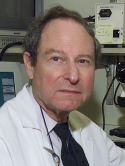Mutant herpes simplex virus induced regression of tumors growing in immunocompetent rats Journal Article
| Authors: | Kaplitt, M. G.; Tjuvajev, J. G.; Leib, D. A.; Berk, J.; Pettigrew, K. D.; Posner, J. B.; Pfaff, D. W.; Rabkin, S. D.; Blasberg, R. G. |
| Article Title: | Mutant herpes simplex virus induced regression of tumors growing in immunocompetent rats |
| Abstract: | Herpes simplex virus (HSV) mutants kill dividing tumor cells but spare non-proliferating, healthy brain tissue and may be useful in developing new treatment strategies for malignant brain tumors. Two HSV mutants, a thymidine kinase deficient virus (TK-) and a ribonucleotide reductase mutant (RR-), killed 7/7 human tumor cell lines in tissue culture. The TK-HSV killed Rat RG2 glioma and W256 carcinoma lines but not the rat C6 glioma in culture. TK-HSV replication (12 pfu/cell) was similar to wild-type HSV (10 pfu/cell) in rapidly dividing W256 cells in tissue culture, but was minimal (<1 pfu/cell) in serum-starved cells, suggesting that the proliferative activity of tumor cells at the site and time of TK-HSV injection may influence efficacy in vivo. Subcutaneous W256 tumors in male Sprague-Dawley rats were injected with TK-HSV or virus free inoculum. A significant effect of TK-HSV therapy on W256 tumor growth was demonstrated compared to controls (p=0.002). Complete regression was observed in 4/9 experimental tumors, with no recurrence over 6 months. Tumor growth in the remaining 5/9 animals was attenuated during the first 3 to 5 days after treatment, but not beyond 5 days compared to 9 matched control animals; no tumor regression was observed in any of the control animals. These results suggest that HSV mutants are potentially useful as novel therapeutic agents in the treatment of tumors in immunocompetent subjects. © 1994 Kluwer Academic Publishers. |
| Keywords: | controlled study; human cell; mutation; nonhuman; glioma; brain neoplasms; animal cell; animal; animal model; antineoplastic activity; tumor regression; tumor cells, cultured; cancer therapy; brain; rat; simplexvirus; cytolysis; thymidine kinase; rats; virus replication; rats, sprague-dawley; tumor growth; herpes simplex virus; immunocompetence; virus mutant; virus dna; ribonucleotide reductase; viral vector; hsv; anti-tumor effect; tyrosine 3-monooxygenase; idoxuridine; human; male; article; ribonucleotide reductases |
| Journal Title: | Journal of Neuro-Oncology |
| Volume: | 19 |
| Issue: | 2 |
| ISSN: | 0167-594X |
| Publisher: | Springer |
| Date Published: | 1994-06-01 |
| Start Page: | 137 |
| End Page: | 147 |
| Language: | English |
| DOI: | 10.1007/bf01306455 |
| PROVIDER: | scopus |
| PUBMED: | 7964989 |
| DOI/URL: | |
| Notes: | Export Date: 14 January 2019 -- Article -- Source: Scopus |
Altmetric
Citation Impact
BMJ Impact Analytics
Related MSK Work





